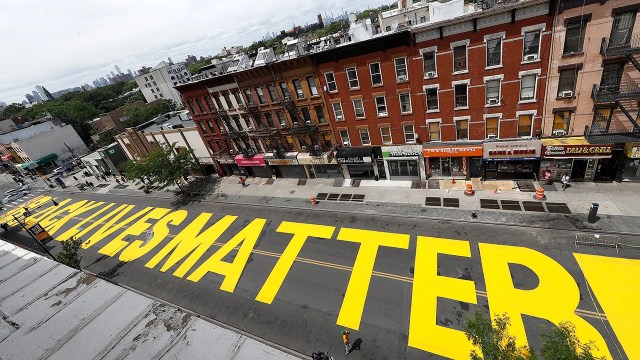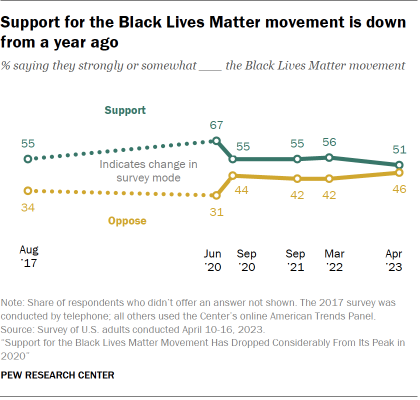A majority of Americans say the increased focus on issues of race in the past three years hasn’t led to improvements for Black Americans

Pew Research Center conducted this study to better understand Americans’ views of the Black Lives Matter movement, videos of police violence against Black people and the treatment of Black people in the United States 10 years after the #BlackLivesMatter hashtag first appeared on Twitter.
This analysis is based on a survey of 5,073 U.S. adults conducted April 10-16, 2023. Everyone who took part is a member of the Center’s American Trends Panel (ATP), an online survey panel that is recruited through national, random sampling of residential addresses. Address-based sampling ensures that nearly all U.S. adults have a chance of selection. The survey is weighted to be representative of the U.S. adult population by gender, race, ethnicity, partisan affiliation, education and other categories. Read more about the ATP’s methodology. Read more about the questions used for this report and the report’s methodology.
References to White, Black and Asian adults include those who are not Hispanic and identify as only one race. Hispanics are of any race.
All references to party affiliation include those who lean toward that party. Republicans include those who identify as Republicans and independents who say they lean toward the Republican Party. Democrats include those who identify as Democrats and independents who say they lean toward the Democratic Party.
Ten years after the #BlackLivesMatter hashtag first appeared on Twitter, about half of U.S. adults (51%) say they support the Black Lives Matter movement, according to a new Pew Research Center survey. Three years ago, following the murder of George Floyd, two-thirds expressed support for the movement.

In assessing the impact of the Black Lives Matter movement, 32% say it’s been highly effective at bringing attention to racism against Black people. Smaller shares say the same about increasing police accountability (14%), improving the lives of Black people (8%) and improving race relations (7%). Overall, 31% of Americans say they understand the goals of the Black Lives Matter movement extremely or very well.
Views of the Black Lives Matter movement vary by:
- Race and ethnicity: 81% of Black adults say they support the movement, compared with 63% of Asian adults, 61% of Hispanic adults and 42% of White adults. White adults are more likely than those in other racial and ethnic groups to describe the movement as divisive and dangerous (about four-in-ten White adults do so, compared with 30% or fewer among the other groups), and they are the least likely to describe it as empowering.
- Age: 64% of adults ages 18 to 29 support the movement, compared with 52% of those 30 to 49, 46% of those 50 to 64 and 41% of those 65 and older. Some 41% of young adults (ages 18 to 29) say empowering describes the movement extremely or very well and 27% say the same about inclusive, larger than the share of adults ages 30 and older who say those words describe the movement well. And while 49% of young adults say the movement has been highly effective at bringing attention to racism, 32% of those ages 30 to 49, 27% of those 50 to 64 and 22% of those 65 and older say this.
- Partisanship: 84% of Democrats and Democratic leaners support the movement, while 82% of Republicans and Republican leaners oppose it. Democrats are more likely than Republicans to say the words empowering (42% vs. 11%) and inclusive (27% vs. 11%) describe the movement extremely or very well. Republicans, in turn, are more likely than Democrats to say the words dangerous (59% vs. 9%) and divisive (54% vs. 19%) describe the movement well.
Jump to:
The nationally representative survey of 5,073 U.S. adults was conducted April 10-16, 2023, using the Center’s American Trends Panel.1
Additional key findings from the survey:
- The vast majority of Americans say they have personally watched videos of police violence against Black people in the news, on social media or in some other way. Roughly nine-in-ten Americans (88%) say they have seen these videos. This includes large majorities across age, racial, ethnic and partisan groups.
- Americans have mixed views of the impact of videos of police violence against Black people being widely shared. Some 45% say these videos being widely shared in the news or on social media is a good thing, while 29% say it’s a bad thing and 24% say it’s neither good nor bad. Most (63%) say these videos being widely shared makes it easier to hold police officers accountable. At the same time, 54% say it makes it harder for police officers to do their jobs.
- Among those who have watched videos of police violence against Black people, 60% say this has had a negative impact on their trust in the police. Smaller but sizable shares say this has had a negative impact on their sense of safety (48%) and their mental health (45%). Most Black adults who have seen these videos say this has had a negative impact on their mental health (63%).
- A majority of Americans say the increased focus on issues of race and racial inequality in the past three years hasn’t led to changes that have improved the lives of Black people. Four-in-ten say the increased focus on these issues has led to meaningful change. The public was more divided three years ago: 46% believed the focus on these issues sparked by the murder of George Floyd would not lead to meaningful change, while 52% of Americans thought it would.
- Two-thirds of Americans say Black people are treated less fairly than White people in dealing with the police. Smaller but sizable shares say Black people are treated less fairly when applying for a loan or mortgage (50%), in hiring, pay and promotions (50%), when seeking medical treatment (44%), in stores or restaurants (41%), and when voting in elections (37%). Americans’ views on this have not changed much since we last asked them in 2020.
- A majority of Americans (57%) say being Black hurts a person’s ability to get ahead in the U.S. these days. Americans are also more likely to say being Hispanic or Asian hurts rather than helps a person’s ability to get ahead. In turn, 60% say being White helps a person’s ability to get ahead.
Like views of the Black Lives Matter movement, attitudes about videos of police violence against Black people being widely shared and the treatment of Black people in the U.S. often vary by race, ethnicity and partisanship.




